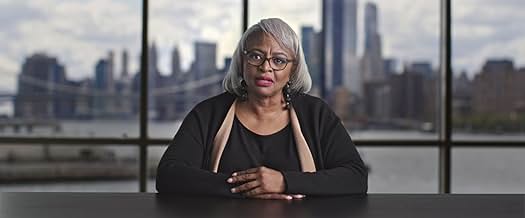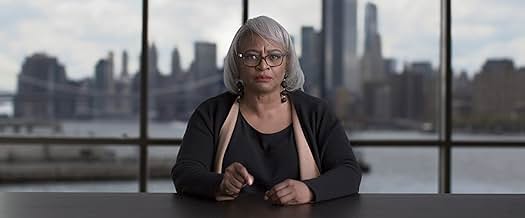IMDb-BEWERTUNG
6,8/10
2092
IHRE BEWERTUNG
Es geht um die Geschichte und den Aktivismus gegen die Unterdrückung von Wählern; Wahlhindernisse, von denen die Menschen nicht wissen, dass sie ihre Rechte als Bürger der Vereinigten Staate... Alles lesenEs geht um die Geschichte und den Aktivismus gegen die Unterdrückung von Wählern; Wahlhindernisse, von denen die Menschen nicht wissen, dass sie ihre Rechte als Bürger der Vereinigten Staaten bedrohen.Es geht um die Geschichte und den Aktivismus gegen die Unterdrückung von Wählern; Wahlhindernisse, von denen die Menschen nicht wissen, dass sie ihre Rechte als Bürger der Vereinigten Staaten bedrohen.
- Regie
- Drehbuch
- Hauptbesetzung
- Für 1 Primetime Emmy nominiert
- 6 Gewinne & 16 Nominierungen insgesamt
Lyndon B. Johnson
- Self
- (Archivfilmmaterial)
Empfohlene Bewertungen
Much of the documentary covers familiar ground - the abolition of slavery, the progress during reconstruction, and then the restriction of opportunities to vote by means both legal and illegal.
In that regard, the documentary repeats a host of documentaries already out there - such as "13th".
What makes this documentary worthwhile is that it sticks to a basic point: it doesn't matter if you're republican or democrat, we should all agree on the basic principle of democracy - one person, one vote, and that all people in good standing should be able to vote. If you accept that premise then it's important to defend it, no matter your political views. Democracy is not a single, simple pure thing. It's messy. Various elites seek to capture the process. Preventing that is not easy.
The film's greatest strength is its moving portrayal of the cost of democracy, It's not just about turning up to vote on the day - it's also about making sure you get the chance to do that. That's takes effort, but that's the price of freedom.
Again, whatever your political views, make sure you have the chance to vote - it's your duty.
What makes this documentary worthwhile is that it sticks to a basic point: it doesn't matter if you're republican or democrat, we should all agree on the basic principle of democracy - one person, one vote, and that all people in good standing should be able to vote. If you accept that premise then it's important to defend it, no matter your political views. Democracy is not a single, simple pure thing. It's messy. Various elites seek to capture the process. Preventing that is not easy.
The film's greatest strength is its moving portrayal of the cost of democracy, It's not just about turning up to vote on the day - it's also about making sure you get the chance to do that. That's takes effort, but that's the price of freedom.
Again, whatever your political views, make sure you have the chance to vote - it's your duty.
"The consequences of anybody here, not turning out and doing everything you can to get your friends, neighbors, family to turn out, the consequences of you staying home would be profoundly dangerous to this country, to our democracy." Barack Obama
That a particular party might like to suppress the votes of its opponents makes some sense in the winner-take-all mantra of any race, but that racial and ethnic suppression does happen is always a shock to those who believe the process of democratic election is sacrosanct. Directors Lisa Cortes and Liz Garbus' insightful documentary All in: The Fight for Democracy dispels any notion that America's elections are pure and unadulterated.
As the centerpiece of this study that covers the history of election fraud and questionable practices up to 2020 in Wisconsin, the Stacey Abrams run for Georgia governor in 2018 best expresses the frustrations of Democrats who perceived the Republicans were throwing up roadblocks from difficult qualifying questions to delayed polls. Abrams fought to the bitter end with only a few thousand votes outstanding and her awareness that she would never win.
Perhaps most dismaying is that Brian Kemp won by 25 K votes among 4 million while over 100,000 were disqualified for not having voted enough previous times. I am personally disappointed that my home state of Ohio has the same illogical suppression.
Abrams' Republican opponent, Brian Kemp, won with the advantage of these "hoops" that minority voters had to jump through, often answering questions like "Who is the clerk of the Superior Court?" He was the Secretary of State in charge of the election process while running for governor, illegal in some states but not Georgia. Such obvious conflicts of interest throw negative light on elections everywhere. However, the co-directors show how voter suppression was common throughout the history of the "Republic." Progressives and moderates have been fighting to suppress the suppression for centuries.
Early on this informative doc shows other manipulative tactics such as gerrymandering, poll taxes, and demands for government ids to keep away the poor, resulting in making the 13th, 14th, and 15th amendments impotent legislation. What the doc does not do is to present a fair assessment by conservatives about why they favored the suppressive legislations. The other side should always be allowed to defend itself in even benign docs like this.
If for nothing else, this important documentary emphasizes the need to vote early, check on the vote's being processed, and exalt in a flawed but fair election. We'll see.
That a particular party might like to suppress the votes of its opponents makes some sense in the winner-take-all mantra of any race, but that racial and ethnic suppression does happen is always a shock to those who believe the process of democratic election is sacrosanct. Directors Lisa Cortes and Liz Garbus' insightful documentary All in: The Fight for Democracy dispels any notion that America's elections are pure and unadulterated.
As the centerpiece of this study that covers the history of election fraud and questionable practices up to 2020 in Wisconsin, the Stacey Abrams run for Georgia governor in 2018 best expresses the frustrations of Democrats who perceived the Republicans were throwing up roadblocks from difficult qualifying questions to delayed polls. Abrams fought to the bitter end with only a few thousand votes outstanding and her awareness that she would never win.
Perhaps most dismaying is that Brian Kemp won by 25 K votes among 4 million while over 100,000 were disqualified for not having voted enough previous times. I am personally disappointed that my home state of Ohio has the same illogical suppression.
Abrams' Republican opponent, Brian Kemp, won with the advantage of these "hoops" that minority voters had to jump through, often answering questions like "Who is the clerk of the Superior Court?" He was the Secretary of State in charge of the election process while running for governor, illegal in some states but not Georgia. Such obvious conflicts of interest throw negative light on elections everywhere. However, the co-directors show how voter suppression was common throughout the history of the "Republic." Progressives and moderates have been fighting to suppress the suppression for centuries.
Early on this informative doc shows other manipulative tactics such as gerrymandering, poll taxes, and demands for government ids to keep away the poor, resulting in making the 13th, 14th, and 15th amendments impotent legislation. What the doc does not do is to present a fair assessment by conservatives about why they favored the suppressive legislations. The other side should always be allowed to defend itself in even benign docs like this.
If for nothing else, this important documentary emphasizes the need to vote early, check on the vote's being processed, and exalt in a flawed but fair election. We'll see.
Stop what you're doing and watch this. Never has a doc been more timely and vital.
Obviously there are team sports being played in the reviews. Critics reviewed this perfectly. Although it's about Abraham's, the film did a great job of adding historic, factual info while also sprinkling 1st hand experiences of ppl affected by suppression.
"Then you ask yourself, why do we have this architecture of all of these obstacles - voter ID, gerrymandering, purging, poll closures - why do we have all of this if voter fraud is virtually nonexistent? When you ask that question that way, then it leads you down a path where America must look at itself again, the way that it looked at itself when it saw the cataclysm on the Edmund Pettus Bridge." -- Professor Carol Anderson
A documentary that works pretty well as a history lesson of voter suppression in America, covering its founding, Reconstruction, the Jim Crow south, and the Civil Rights movement in ways that are accessible and informative. More importantly, it connects the dots to the present day, leading to the shameful gutting of the Voting Rights Act in the Shelby County v. Holder Supreme Court decision, and its creation of "Jim Crow 2.0" as Carol Anderson put it. I liked how it reminds us of Chief Justice John Roberts' apprenticeship under William Rehnquist, and the latter's role on the front lines of voter suppression in Arizona in the 1960's. I liked how it also reminded us of the genesis of Florida's ban on ex-felons voting (hint: it's racist). The film puts a lot of its focus on Stacey Abrams and her narrow loss in Georgia's 2018 gubernatorial election, one rife with voter suppression and certainly a worthy topic (she's such a fantastic leader!), though I think it sacrifices a few things as a result, such as the disastrous Rucho v. Common Cause gerrymandering decision. It does present the case that change is only possible through sustained effort and protest, and that voting is a critical part of democracy, serving as an effective call to action. Overall, well worth watching, as the fight continues.
A documentary that works pretty well as a history lesson of voter suppression in America, covering its founding, Reconstruction, the Jim Crow south, and the Civil Rights movement in ways that are accessible and informative. More importantly, it connects the dots to the present day, leading to the shameful gutting of the Voting Rights Act in the Shelby County v. Holder Supreme Court decision, and its creation of "Jim Crow 2.0" as Carol Anderson put it. I liked how it reminds us of Chief Justice John Roberts' apprenticeship under William Rehnquist, and the latter's role on the front lines of voter suppression in Arizona in the 1960's. I liked how it also reminded us of the genesis of Florida's ban on ex-felons voting (hint: it's racist). The film puts a lot of its focus on Stacey Abrams and her narrow loss in Georgia's 2018 gubernatorial election, one rife with voter suppression and certainly a worthy topic (she's such a fantastic leader!), though I think it sacrifices a few things as a result, such as the disastrous Rucho v. Common Cause gerrymandering decision. It does present the case that change is only possible through sustained effort and protest, and that voting is a critical part of democracy, serving as an effective call to action. Overall, well worth watching, as the fight continues.
Wusstest du schon
- VerbindungenReferenced in Late Night with Seth Meyers: Stacey Abrams/David Byrne/Sonny Emory (2020)
- SoundtracksTurn Tables
Written by Janelle Monáe, Nate 'Rocket' Wonder, and George A. Peters II
Performed by Janelle Monáe
Produced by Nate 'Rocket' Wonder and Roman GianArthur Irvin
Top-Auswahl
Melde dich zum Bewerten an und greife auf die Watchlist für personalisierte Empfehlungen zu.
Details
- Erscheinungsdatum
- Herkunftsland
- Offizieller Standort
- Sprache
- Auch bekannt als
- Her Şey Dahil: Demokrasi Mücadelesi
- Produktionsfirmen
- Weitere beteiligte Unternehmen bei IMDbPro anzeigen
- Laufzeit1 Stunde 42 Minuten
- Farbe
Zu dieser Seite beitragen
Bearbeitung vorschlagen oder fehlenden Inhalt hinzufügen

Oberste Lücke
What was the official certification given to All In: The Fight for Democracy (2020) in Canada?
Antwort































